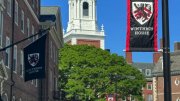For the past year and a half, a Harvard committee deliberated whether to change the name of Winthrop House. The Harvard and the Legacy of Slavery report, published in 2022, said that its two namesakes, early Massachusetts governor John Winthrop and his great-great-grandson Professor John Winthrop, both owned slaves. In March 2023, a group of students submitted a formal denaming request to the Faculty of Arts and Sciences, writing that the two Winthrops “were instrumental in creating, maintaining, and defending slavery.”
On Thursday, Harvard announced that the House will retain the Winthrop name. But its formal name will be changed from “John Winthrop House” to “Winthrop House.” The committee hopes that the minor change will honor the 400-year legacy of the Winthrop family while deemphasizing the two John Winthrops, whose legacies are complicated and intertwined with slavery.
The Winthrop decision is the second name ruling since Harvard formalized a process for denaming in 2021. Last summer, Harvard formally declined a student request to dename the museum and building named for Arthur Sackler, cofounder of the pharmaceutical company that became Purdue Pharma, whose aggressively-marketed painkiller OxyContin became a major contributor to the opioid crisis. No other denaming proposals are currently pending.
The committee writes that the House is only named for Professor John Winthrop (1714-1779), not his famous great-great-grandfather, Governor John Winthrop (1588-1649). Archival research revealed that when Harvard named the House in 1930, the Corporation intended to honor the younger Winthrop, who twice served as interim Harvard president. But then-president Abbott Lawrence Lowell wrote that “if a House were named after John Winthrop, everyone would think it was named after the Governor, for although the astronomer was a good man, he was hardly a very eminent scientist.” In the 96 years since, Lowell’s prediction came true—even reports sanctioned by the University itself assumed the House was named for both.
The report analyzed the complicated legacy of each John Winthrop. The governor helped grow Massachusetts. His writings, such as A Model of Christian Charity, are still central to American identity. But he served as governor during the Pequot War, when English colonists allied with several Native tribes and attempted to exterminate the Pequot tribe. Winthrop took several Pequot captives into his home. The professor, meanwhile, had a mixed reputation—one author called him the greatest American scientist of the eighteenth century, aside from Benjamin Franklin, while other historians are less impressed by his scientific contributions. Professor Winthrop “more likely than not” enslaved two people, the report said.
A core question emerged: Should buildings be named after slaveholders? Harvard’s denaming process requires considering whether “actions or beliefs we now regard as abhorrent would have been regarded as objectionable in the namesake’s own time.” Even in Professor Winthrop’s era, three decades before Massachusetts banned slavery, “being an enslaver would not have been abhorrent to all at the time,” the group wrote, though regional opposition to slavery was “not uncommon.” But the committee said “the degree to which those beliefs and behaviors are a significant component of the life and legacy of both John Winthrops is a question that invites reasonable disagreement.” The group “did not come to certainty” about whether owning slaves, even if legal, is sufficient to merit denaming.
The committee believes removing “John” from the Winthrop House name honors the long history of the Winthrop family while acknowledging the complex legacy of the two Johns. Across 35 outreach conversations and 100 survey responses, the group came to believe that “the Winthrop name in general has positive associations that push in favor of retaining the house name,” but noted “there are complications associated with restricting it to these two individuals.” The legacies of the two Johns exist in a middle ground: not clear-cut enough to dename, but objectionable enough to not merit specific honor.
Harvard’s denaming guidelines provide the committee three choices: “take no action, dename, or to keep the name but contextualize it.” The Winthrop task force agreed that “no single option stated above can fully capture the depth of its work,” so opted to slightly change the name while providing additional historical context. Totally denaming the House, the group argued, would deprive Harvard students “the chance to reckon with the institution’s history.” The report calls for new initiatives to examine Winthrop House’s history.
At Harvard, the deliberations came during a particularly fraught period. The initial petition was sent to then-President Lawrence S. Bacow, the committee was formed by then-President Claudine Gay, and the results were accepted by President Alan M. Garber. The group assessed racial legacies while Harvard was in the national spotlight, particularly for campus antisemitism and efforts to reckon with racial injustice through diversity, equity, and inclusion efforts.
The committee was chaired by Dean of Arts and Humanities Sean Kelly. Its members included Scott professor of law Elizabeth Kamali, Peabody professor of American archaeology and ethnology Matthew Liebmann, chief campus curator Breada Tindal, and Executive Vice President Meredith Weenick.
Going forward, the committee hopes that a John-less Winthrop House can honor the contributions of the Winthrop family to the school and the nation: “The Winthrop name therefore mixes elements worth embracing with those worth repudiating; all are worth remembering. Perhaps this is the most that one can hope for from an almost four-century long history of a family.”









